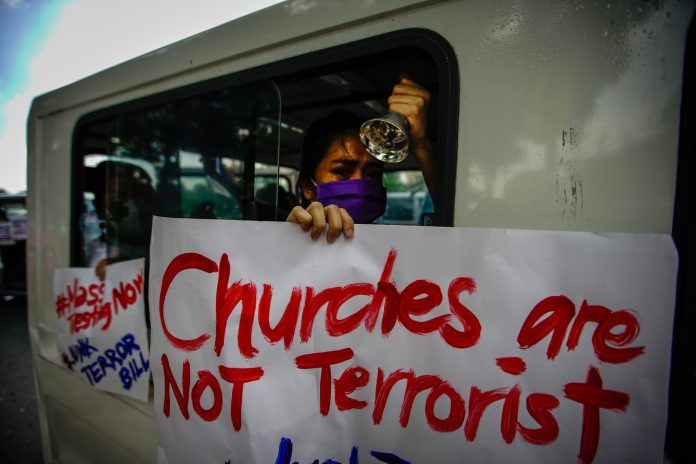CHURCH and religious leaders in the Philippines denounced the passage this week of a proposed anti-terrorism law, calling it a threat to basic freedoms and civil liberties.
“Now more than ever, we need the power of dissenting voices in the current state of political and public health in our country,” said Bishop Gerardo Alminaza of the Diocese of San Carlos.
“It is high time that citizens and members of civil society organizations set aside their differences to combat the passage of this bill,” he said.
On June 2, the House of Representatives approved the Human Security Act of 2007, known as the anti-terrorism bill.
The controversial measure, which was approved without amendment, was put to a vote a day after President Rodrigo Duterte certified the bill as urgent.
Congressmen voted 173-31 with 29 abstentions to approved the proposed measure.
Bishop Alminaza said that while the fight against terrorism is legitimate and necessary, the respect and defense of human rights must be of “paramount consideration.”
“We maintain that the proposed law is open to abuse by despotic governments to visit terror against critics and the people in general,” he said.
“This government is criminalizing dissent, further suppressing criticism, while at the same time evading accountability, in the guise of combating terrorism,” added the prelate from the central Philippines.
Truth as first casualty
Bishop Ruperto Santos of Balanga warned that “truth will be the first casualty” of the proposed measure, which just lacks the signature of President Rodrigo Duterte to take effect as law.
“It can easily be abused given that the checks and balances are too weak in this country,” added Bishop Broderick Pabillo, apostolic administrator of the Archdiocese of Manila.

Bishop Arturo Bastes, retired prelate of Sorsogon noted that Congress seemed to have become “too subservient to the president to whom many of them owe their political position.”
The bishop said the proposed measure poses “great danger” not to terrorist but to the Filipino people who will be exposed to violations of civil and political rights.
He expressed disappointment over Congress for “freely and willingly giving dictatorial powers to Duterte,” whom the prelate described as “an admirer of (former president Ferdinand) Marcos.”
“I am sure that with the bill turned into law, Duterte will have a heyday of violating human rights with impunity,” said Bishop Baster.
“The victims will, of course, be the millions of suffering poor Filipinos,” he added.
Bishop Bastes said legislators should have enacted laws that “favor the weak and the poor because laws are created to uphold those who have less in life.”
‘Troubling developments’
The Association of Major Religious Superiors in the Philippines expressed deep concern in what it described as “troubling developments” even amidst the coronavirus pandemic.
The group said the government has become “deaf” to calls to address the nation’s most urgent concerns and instead address “peripheral issues.”
The association of religious congregations in the country also warned that acts of dissent, free speech, right to assemble, the right to organize, and freedom of belief are threatened by the proposed anti-terror law.
“We are wary that the bill runs contrary to the fundamental law of our land,” read the group’s statement, adding that it will only “exacerbate the very precarious human rights situation” in the country.
The religious leaders said the bill will “only worsen the division and disunity,” warning that “we might see no end to the spiral of violence in our midst.”

Arrests, longer detention
Under the proposed law, a suspected terrorist can be detained without a warrant for 14 days, extendable by 10 more days, and can be placed under surveillance for 60 days, extendable by up to 30 more days.
The bill also authorizes wiretapping of suspected terrorists for a maximum period of 90 days as an amendment to the Anti-Wiretapping Law and detention without judicial warrant of arrest for a maximum period of 24 days instead of the present three-day maximum.
The proposed law empowers the Anti-Money Laundering Council to pry into the bank accounts of suspected terrorist groups and persons without a specific court order by freezing such accounts for 20 days, subject to six months’ extension by the Court of Appeals, as an exception to the “Law of Secrecy of Bank Deposits.”
A preliminary order of proscription of alleged terrorist organizations also has no terminal duration pending proceedings before the Court of Appeals.
The measure defines terrorism if a person commits any of the following:
- engaging in acts intended to cause death or serious bodily injury to any person or endangers a person’s life
- engaging in acts intended to cause extensive damage or destruction to a government or public facility, public place, or private property; engaging in acts intended to cause extensive interference with, damage, or destruction to critical infrastructure
- developing, manufacturing, possessing, acquiring, transporting, supplying, or using weapons
- releasing dangerous substances or causing fire, floods or explosions when the purpose of such act, by its nature and context, is to intimidate the general public, create an atmosphere to spread a message of fear, provoke or influence by intimidation the government or any international organization, or seriously destabilize or destroy the fundamental political, economic, or social structures in the country, or create a public emergency or seriously undermine public safety.
Threats to commits terrorism and proposals to carry out the act will be punishable by imprisonment of 12 years while conspiring, planning, training, preparing, and facilitating to commit the act will be punishable by life imprisonment.









